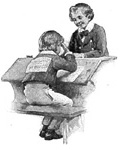
Recovering the Lost Tools of Learning
ADVANCING CLASSICAL EDUCATION AT MERCY ACADEMY
“The pursuit of wisdom especially joins man to God in friendship.” — St. Thomas Aquinas, Summa contra Gentiles I 2.i
Introduction
The mission of Mercy Academy — stated in the motto on its official seal — is to prepare students “to bear witness to the truth” (Jn. 18:37). Bearing witness is, of course, different from repeating hearsay. A witness’s testimony does not depend on what others say but on what he has himself seen or learned. The curriculum of Mercy Academy is designed, accordingly, to teach students how to learn, not merely to repeat what others have told them. Our school is a gymnasium for exercise in the arts of learning rather than a dispensary for the transmission of information.
This gymnastic conception of schooling is unabashedly countercultural. In our “media” age, people commonly mistake manipulative capacity for wisdom and data retrieval for knowledge. Most schools reflect this misunderstanding in their curricula. But Mercy Academy approaches the task of education differently. To cultivate the learning skills that youngsters need to fulfill the responsibilities and enjoy the privileges of adulthood, Mercy provides:
(1) A Catholic culture in which our Faith is lived and learned.
(2) Instruction in phonics rather than “whole language.”
(3) Rigorous exercise in the four operations of arithmetic — without the use of calculators.
You May Also Enjoy
An affirmation of Church teaching at Providence College is seen by students and administrators as an act of "homophobia" and "transphobia" that warrants intimidation and threats because it's an offense against the PC narrative.
In this special section, which runs as an occasional feature, we present samples of the offerings in the Narthex, the NOR’s online blog.
Students, a new cohort of faithful faculty members, and orthodox bishops are beginning to pay more attention to what is happening on Catholic campuses.

